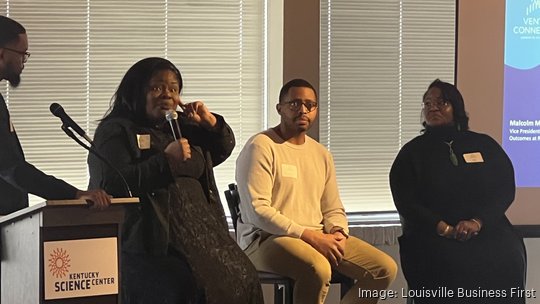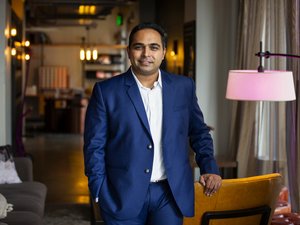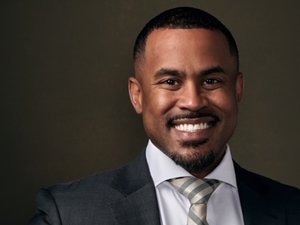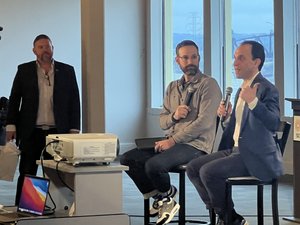
A group of three panelists sat in front of a crowd gathered at the latest edition of Venture Connectors on Wednesday at the Kentucky Science Center in Downtown Louisville.
In honor of February being Black History Month, the panel had the self-explanatory title of “Reset and Reflect: The Landscape of Venture for Black Founders Over the Last Four Years.”
Although the moderator and the three panelists were Black, the overall tenor of the conversation was one of universality of the struggle of being a founder.
“The difference is when other demographic founders have financial troubles, they have places to go or rather to be able to get relief, right? But as a founder [though], we all experience the same woes,” said Tawana Rivers, referencing the discrepancy of Black founders gaining access to capital compared to others, which is even a tougher situation for Black female founders.
Rivers — who serves as the CEO for The 10K Project, Inc., which invests capital in Black founders — was joined on stage by Monique Kuykendoll Quarterman, executive director for entrepreneurship and innovation at the Kentucky Cabinet of Economic Development; and Jeremiah Chapman, the founder and CEO of Louisville-based FreshFry.
The three answered questions posed by Malcolm Muhammad, who works as the vice president of engagement and outcomes at the Atlanta-based Russell Innovation Center of Entrepreneurship.
“2020, it happened to everyone. It was very challenging,” Chapman said.
Chapman, who founded his company in 2014, told the story of how he went from gaining a lot of traction for his plant-based frying oil purification system. Then overnight, his company lost 99% of its sales — two weeks after it had gained its first term sheet.
At the time, Chapman said FreshFry had enough cash in the bank to last for about a month. The company had three employees, one of whom had just had a baby and one of whom had one on the way.
“Really, it seemed like the world prioritized survival, which put into perspective that there are things bigger than just trying to raise money,” said Chapman, whose company would be named to our 2022 Startups to Watch two years laster.
He recalled there being 73 days between getting a term sheet and closing a round with investors, some of whom were in attendance.
“What I learned in that time is when you don’t know what to do, have really clear conversations, and serve as much as you can. Be very clear with what you need, and those who are meant to join you on the journey, they do,” he said, whose company recorded $1.7 million in capital raised in December.
At the beginning of the talk, Chapman referred to the importance of place for a founder — regardless of his or her ethnicity or background.
“What FreshFry really does is we take materials that people found valueless … and turn it into something so valuable, that it is scaling tremendously,” Chapman said. “What I want to remind people of is when you find your place, when you find your value, everything really starts to move. Really, my company is just an expression of that.”
All of the panelists mentioned the struggle of trying to find capital, with Rivers alluding to “The Wizard of Oz” along the way while encouraging the development of grassroots, community-based funding opportunities: “The [venture capitalists’] money is almost like the Wizard, right? It’s behind the curtain somewhere … but I see you, right? I can talk to you. I can teach you about investing.”
Quarterman — who is known to keep a busy travel schedule to keep up with the innovation hubs throughout the commonwealth — implored the ecosystem to “develop a culture of yes,” when it came to being receptive to requests by other members.
“I’m sitting in this chair right now, because half of you in the audience have told me ‘yes’ at some point … So as investors in this room, ask yourself, ‘What can I do to advance that culture? Look at your portfolio. Ask yourself the question of ‘Is his reflective of the community that I say that I’m serving?’"









